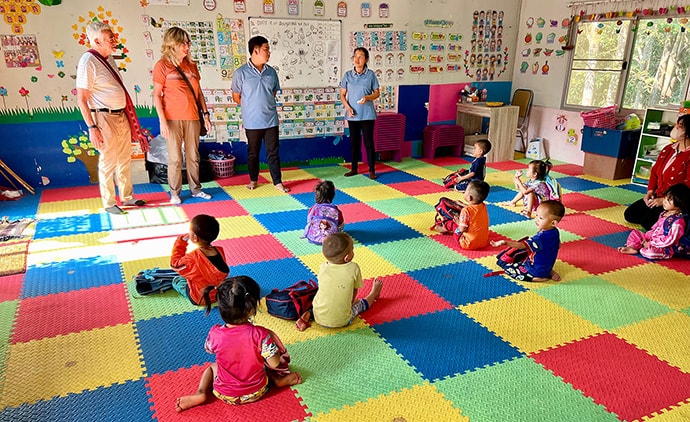
Visit with FORTUNE school, Thailand. Photo: Emily Ho
Periodically, Pangea Giving “Pod” committees, composed of members interested in a particular geographic area, organize site visits to meet with existing grantees and prospective new grantees. The purpose of the site visits is to observe the grantees’ work, talk with organization leaders, and evaluate first-hand the viability of a renewed grant. Additionally, site visit teams try to identify, and if possible meet with the leaders of prospective new grantees
Site visits are an important element of Pangea’s partnership with grantees. Members gain insight into the political, social, economic, and environmental challenges our grantees face. Spending time with grantees also builds personal connections and understanding that strengthens our long-distance communication. While on site visits, members assess the leadership and staffing, review financial information, and confirm that grantees are following the grant guidelines and agreements.
This past February, a small group of Pangea members from the Southeast Asia Pod conducted a site visit in Laos and Thailand. Here follows a brief description of their trip.
Green Community Volunteers (“GCV”), Laos
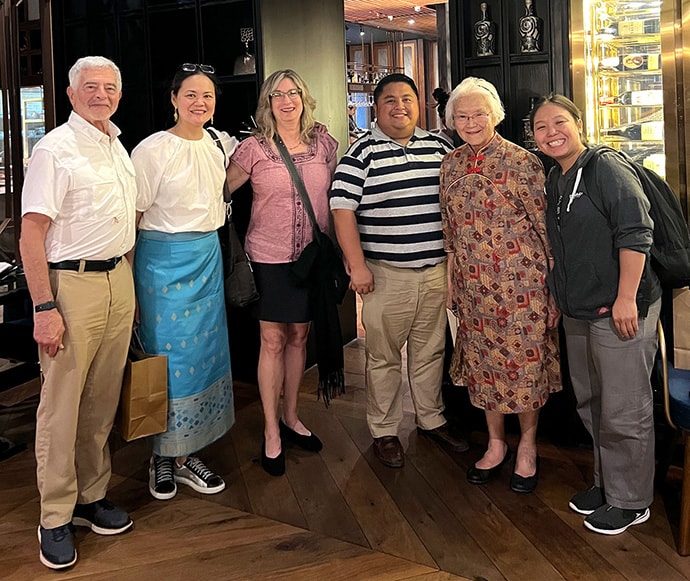
Visit with GVC.
GVC’s project purposes include building leadership capacity for indigenous youth and women to advocate for environmental issues, land rights, and food security. They also provide training on sustainable agriculture and women’s health issues. Pangea conducted a multi-day site visit to a GVC project village last year (2023). A description of that site visit can be found on the GlobalWA website. This years’ visit was more social and involved only a meeting with 2 of GCV’s 3 key leaders in Vientiane.
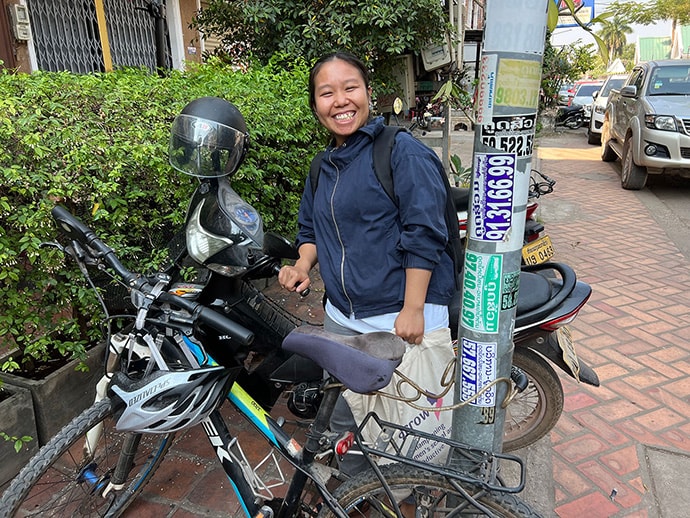
Noud from GVC. Photo: Emily Ho
They confirmed that GCV continues to move forward with the projects as described in their grant application. Additionally, one of GCV’s leaders, Noud was extraordinarily gracious in identifying several potential new grantees in Laos for us. She coordinated and set up appointments for us to meet with them. In addition, Noud spent an entire day acting as Lao interpreter for the prospective grantees we met with in Vientiane.
- Grant Pillar(s): Indigenous Rights; Climate and Environmental Justice
- 2024 Grant: $6,100 (previous grant: $5,800)
FORTUNE, Fang, Chiang Mai province, Thailand
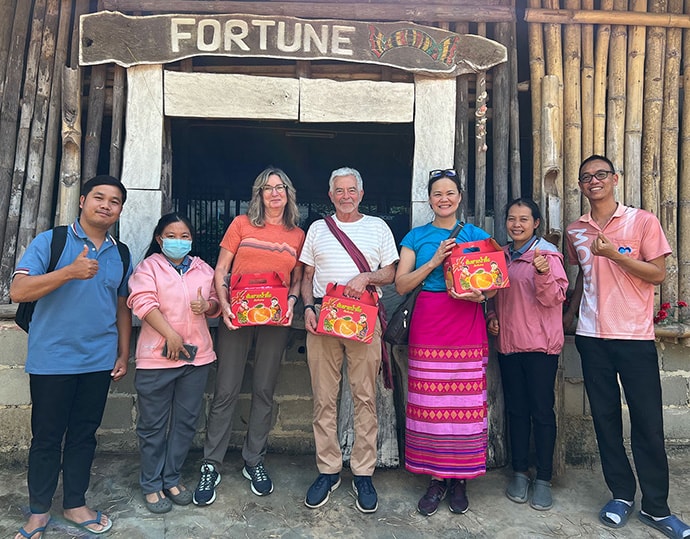
SE Asia Pod members visit with FORTUNE.
FORTUNE’s project purposes are to provide support to Myanmar refugees and migrant workers living in Thailand.
We visited Fortune at its headquarters, in a rural area outside the city of Fang, near the Myanmar border. We met with Sai Mu, the finance director (and designated English interpreter), Aii, Fortune’s director, and several other staff members.
In a comprehensive PowerPoint presentation, Fortune described their ongoing programs, all related to helping Myanmar migrants living in Thailand:
1. Identification Card program
Thailand has multiple types of ID cards for migrants and the system is extremely complicated. Many migrants are taken advantage of and end up owing money to “brokers” who “help” them obtain their ID cards. Migrants without ID cards are subject to deportation and are often taken advantage of by operators of agricultural labor camps. Additionally, without the appropriate ID card, migrant children cannot attend Thai government schools or qualify Thai government health care programs, including vaccinations. Fortune has multiple education programs for migrants to navigate the process, both online (Facebook, YouTube, Tiktok), via local radio stations, and through in-person outreach at camps along the Thai-Myanmar border. They also help migrants fill out the paperwork since many speak only Burmese or Shan ethnic language.
2. Mother-child Health program
Fortune provides education for migrant mothers, and acts as interpreters at health clinics and the local hospitals. Since many migrants do not yet have ID cards, they have to pay cash for healthcare. Fortune helps provide funds or loans for these people as well as provides transportation and food for those who are hospitalized.
3. Media program
Fortune produces educational videos and other programs via social media (see program #1) to educate migrant workers. Topics include Covid19, migrant rights under Thai laws, advice on ID cards, and Thai language lessons. These programs are accessible to all migrants including those elsewhere in Thailand and in Myanmar. The programs can be viewed on smartphones. Fortune reports they have 40,000 followers already!
4. Community Network program
Fortune helps connect migrants living in multiple communities including those in nearby farm working camps and those living in other border camps. They report that migrants face many difficulties. For example, some are deeply in debt, having paid large fees and bribes to cross the border into Thailand. Some migrants have been placed in Thai deportation prisons. Fortune helps provide food for these deportees. Fortune also works with local Thai officials and healthcare facilities to provide a connection with the migrant community. According to Partners Asia, Fortune is one of the few organizations that has good working relationships with Thai government officials.
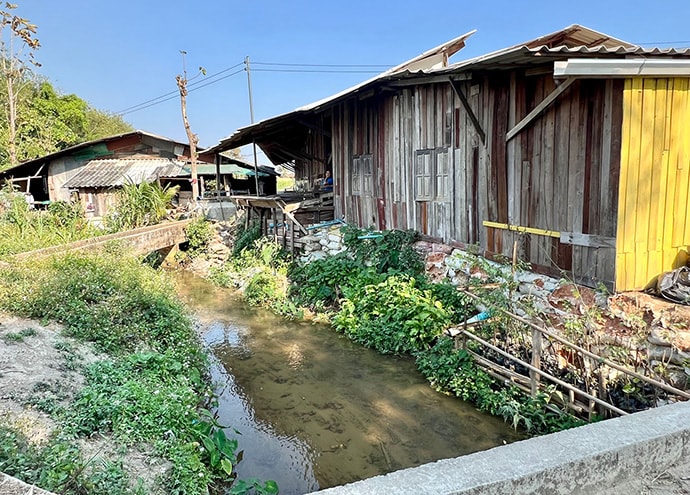
FORTUNE barn for migrants. Photo: Emily Ho
After our meeting, Sai Mu took us to visit migrant families living nearby. We saw migrant families living in very basic conditions in a converted barn surrounded by fields. We also visited a local temple where a school for Shan ethnicity migrant children is located. These children can learn the Thai language in order for them to be prepared to attend the local Thai schools. While the school appears well supported, many of the children appear traumatized and unhealthy. Of note, many of the children cannot be eligible for free vaccinations from the local clinic because they are undocumented.
In addition to our grant, Fortune receives grant support from a local Shan women’s NGO, a Singaporean NGO, and Partners Asia. Their current annual budget is ~$20,000 and their budget is growing. They have ideas to expand their healthcare outreach to include female health initiatives (breast cancer and cervical cancer screening), as well as expand Shan children education (teaching children located at remote Thai farms).
- Grant Pillar(s): Refugee and Migrant Rights
- 2024 Grant: $8,700 (previous grant: $3,300)
Visit our SE Asia Grant Partner page for more information about these organizations.
****************
Pangea Giving is a program of GlobalWA. Explore more on our Pangea Giving program page, or learn more about the Pangea Experience. Questions? Email us at pangea@globalwa.org.